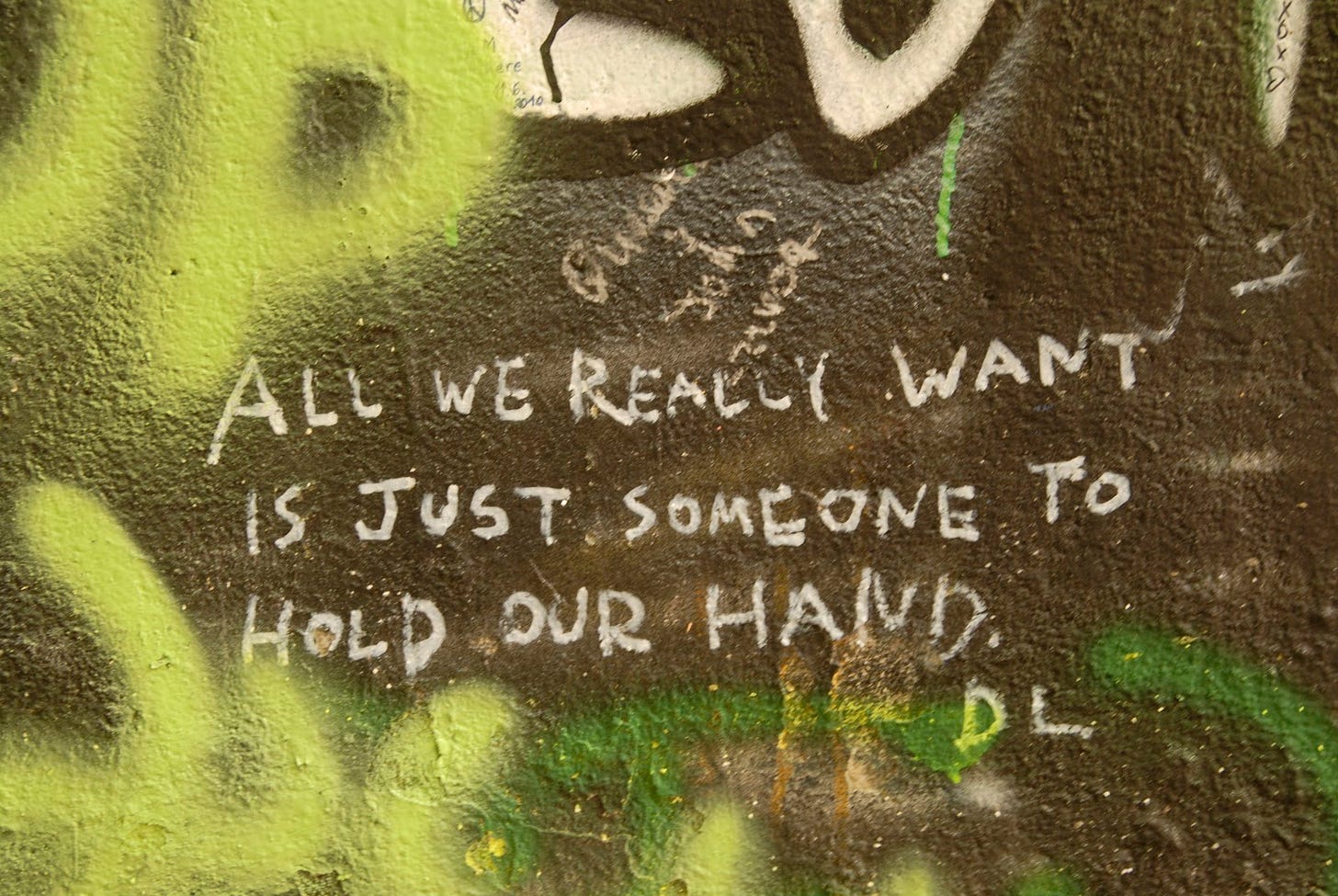Lennon Wall, Prague
Last week, I shared about Parker Palmer’s “tragic gap,” that space between hard realities and taking action towards new possibilities. And, we talked about the importance of staying in the tension of that gap and not rushing to fix anything. To pause, listen, and learn.
This week, let’s look at what’s required in that gap when it comes to confronting suffering, seeing it clearly, particularly human suffering. Is it empathy or compassion? What’s the difference?
Empathy vs Compassion
Empathy is feeling what someone else is feeling, in a sense, putting yourself in their shoes. It’s a natural, instinctive response, a seeing with the heart (which we touched on previously), without necessarily having an active response. For example, if we see children starving in other parts of the world, we feel empathy but don’t necessarily know the roots of the problem or what to do about it.
As the article excerpt below explains, empathy can be dangerous if applied only to those who are like us.
“Empathy is the brain’s wired tendency to identify with those who are close to us – close in proximity, close in familiarity, or close in kinship. And when we empathize with those close to us, those who are not close or are different seem threatening. When unchecked, empathy can create more division than unity.” ~ Four Reasons why Compassion is Better for Humanity than Empathy, Forbes Magazine
Compassion is closely linked to empathy, because the roots of the word mean “to suffer with” and the common definition extends the feeling of empathy to a desire to fix or alleviate another’s suffering.
A.H. Almaas, in his book, Diamond Heart, Book One: Elements of the Real in Man, calls this “the elementary level” of compassion. We see a need and want to help. Helping makes us feel good. On a deeper level, though, compassion is about seeing the truth, no matter how painful that may be, and getting to the root of the suffering.
Compassion is not taking on the weight of the world. It’s not sympathy or pity, or even empathy. True compassion lets someone know that you recognize their suffering. It doesn’t take the pain away, but rather makes it easier to bear because the person doesn’t feel so alone. They feel seen.
Cultivating Compassion
It may seem that some people are just born more compassionate than others and that may be true. But, compassion is a quality that can be cultivated and deepened with practice.
One of the best books I’ve read on how to do this is by Gail Straub - The Rhythm of Compassion: Caring for Self, Caring for Society. It includes all kinds of exercises to help you cultivate your own compassionate self. Often, the areas where you were not shown compassion are clues as to where you feel an impulse to contribute.
Straub says that mature compassion requires: a quiet mind, an open heart, presence, and simplicity. Each of these elements creates space for compassion to develop.
The first two - quiet mind and open heart - are about caring for yourself first so that you can care for others. A quiet mind can be developed through meditation, prayer, yoga, or walks in the woods. Opening your heart is realizing that suffering is universal. We all experience suffering, to different degrees, and remembering our own helps us understand it in others.
Presence is standing in the tragic gap and it grows from the previous two. It requires listening and being with someone in their suffering, without withdrawing or trying to fix. True presence, without judgment, is a rare skill. Simplicity comes from presence. As we sit with someone in their suffering, and let go of our need to fix, any action that is helpful will become apparent.
I learned this lesson from an acquaintance who was dying of cancer. We had recently met and although I did not know her well, we had a strong connection. I felt compelled to be with her in her dying days. She already had a strong support group, people who brought her food, gave her manicures, and washed her hair. Mostly, we would just go out for lunch.
Not long before her death, she sent me a beautiful card that I still have and cherish. In it, she wrote that I didn’t need to worry about doing more for her (I hadn’t told her that I was worried about this). She said that my presence when we had lunch together was one of the best gifts she had ever received. I couldn’t fix her suffering but I could be with her in it.
Practice
Notice when you feel empathy this week and how it is a feeling that is different from compassion. Is there anyone or a group that you exclude from empathy?
Where do you feel true compassion and how is that different? How do you move beyond putting yourself in their shoes and get to the root of the suffering? Quiet your mind. Open your heart. Practice presence and simplicity, being with, rather than trying to fix. What actions naturally follow from this practice?
Resources
The Invention of Empathy: Rilke, Rodin, and the Art of Inseeing via The Marginalian (formerly Brain Pickings)
Four Reasons why Compassion is Better for Humanity than Empathy, Forbes




